Last updated: 18 October 2003
|
Last updated: 18 October 2003 |
This page documents Kodak models comments, tips, and photos. Search the site for "Kodak" for other items about the Kodak digital cameras. Contributions welcome.
Jump to the Start of Today's Update (please wait for the page to finish loading).
Subject: ETX / adapter for Kodak DC215 Sent: Saturday, December 29, 2001 6:38:33 From: Luettjohann@gmx.de (Stephan Lttjohann) Thanks a lot for your wonderful ETX site. It helped me a lot in the decision to buy an ETX 90EC telescope about four weeks ago. Your site also showed me what I can expect from this telescope and how to make it work. Great job! My ETX workes really great together with the autostar. I trained the drives as described on your site and built a serial cable for the autostar and my PC. I have built an adapter for the Kodak DC215 digital camera to use it with the ETX in eyepiece projection. The DC215 hasn't got a threaded lens. The adapter I built works very well. It is easy to build and cost only around 2 dollars. The assembling instructions can be found on my website: www.eddy.uni-duisburg.de/stephan/astro.htm If you think you can use it for your site, you can add a link to my site or just copy it to your site (as you like it). There is also a very small gallery of my very first astronomical photos as well as terrestrial photos (all taken with my adapter and the DC215). Thanks for your great job! Clear skies! Stephan __________________________________________________________________ Stephan Lttjohann Luchsweg 7 46446 Emmerich email: luettjohann@gmx.de Germany http://www.eddy.uni-duisburg.de/stephan
Subject: I'm A Newbee (again) Sent: Tuesday, January 22, 2002 20:33:12 From: fmbfla@iline.com (Drew) Hello, and Thank You! My name is drew (Andrew), I don't know what I was doing when I came across your WWW, but I will tell you this. Your site and the information that you and your followers have placed for all the world to see and learn ignited the fire in me once again. A long, long time ago (in the not so distant past) I had gotten into looking to the skies so bad that I used to take an old 5" reflector that my father found at a yard sale with me on my moped (A long time ago, I wasn't old enough to drive a car yet). I lived on the barrier island of Fort Myers Beach. the skies were always bright with the light of the stars when I was younger, they still are off to the WSW. 'Anywho', I would spend hours by myself looking through the tube and just be down right amazed at what I saw with something other than Bino's or the naked eye. When Haley's Comet was due through back then, I tried so hard to take pics with my pentax ME on piggy back but was not knowledgeable in this "new" type of hobby and got zipped, and with no one in my area at the time with any info I eventually just let that old hobby go and went on with what 14/15 year olds do on an island, I went fishin' ( but I still looked up at the biggest candy bar ever!! :-) Flash to: Today After finding your site I new right away that I had to get back that thing that I had so many years ago. Through reading all (well,most all) of the info you have on your site, I was sold on just going out and getting me a new scope that I could handle and use often ( every night since I got it :-).I purchased the ETX 90 EC and was just down right amazed at what has changed in the scope industry. Then, I noticed a link on your web site "scopetronix" I had no idea!!! This place is literally within walking distance for me from my house here in Cape Coral. This place is the "Bomb!". I browsed his web site and noted the Items that I would like to enhance my viewing pleasure, I then drove down ( I'm old enough now ) walked in and was greeted and serviced promptly with all the items on my list and informed of a local club for viewing events for this month as well. My nieces have just flipped over this scope and now I have to be the official timer for viewing time when they come over. Tonight I was alone and was able to use the EZ-Pics Afocal adapter for my Kodak DC 240, (Kodak has a 37 mm screw-on lens adapter for use with DC240, 280, or 3400 camera www.kodak.com/US/en/digital/accessories/lenses/ lensAdapter240_280_3400.jhtml ) to take a few images the moon, Jupiter and Saturn I thought the best single shot of Jupiter was a good one to send to you and your readers showing it isn't hard to do something that is fun and enjoyable, and with patience and practice anything is possible ( even feeling young again! ). Thank You, Mike Weasner Andrew Michie
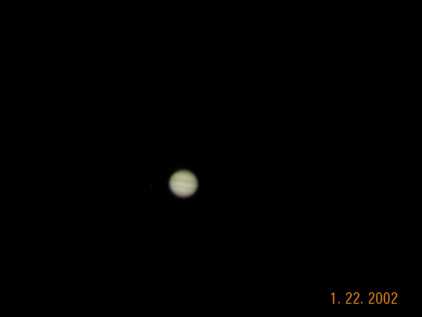
Subject: Saturn
Sent: Thursday, January 24, 2002 19:32:51
From: fmbfla@iline.com (Drew)
SATURN
ETX 90 EC [Polar]
26mm sp
2X Barlow
Scopetronix EZ-Pix Cam Adaptor (Recommended)
Kodak DC-240
View screen on (need it) Exposure compensation set
@ + 1.0 Flash off (duh) White Balance = Auto Zoomed
to 2.0 ("max zoom" then tap zoom button for smaller
incriments) Self timer used ( not holding the
Autostar will prevent blur )
Taken on the date shown
single image, no editing
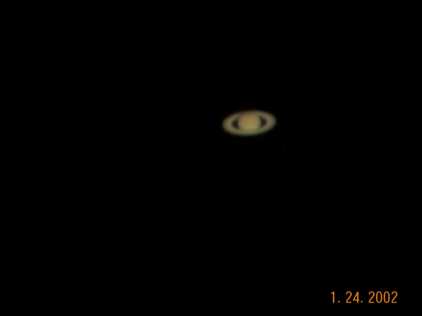
MOON
ETX 90 EC [Polar]
26mm sp
2X Barlow
Scopetronix EZ-Pix Cam Adaptor (Recommended)
Kodak DC-240
View screen on (need it) Exposure compensation set
@ + 1.0 Flash off (duh) White Balance = Auto Zoomed
to 2.0 ("max zoom" then tap zoom button for smaller
incriments) Self timer used ( not holding the
Autostar will prevent blur )
Taken on the date shown
single image, no editing

Subject: Astrophotography Sent: Sunday, January 27, 2002 8:34:10 From: r.rondjeff@verizon.net (Ron) Here is my first attempt at trying to take a few pictures through my DS2130ATE & a Kodak DC4800. I used the Digi T from Scopetronix and a 30mm Plossl eyepiece. The rest of the information is on each picture. Thanks, Ron
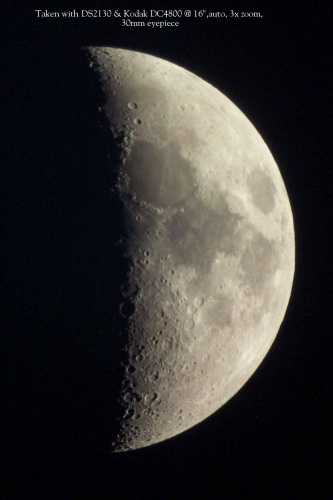
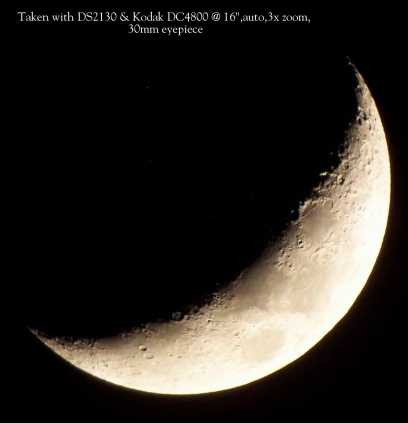
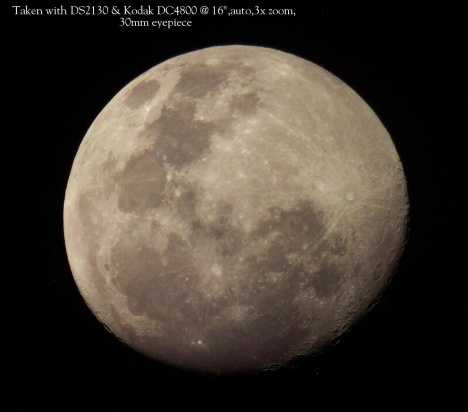
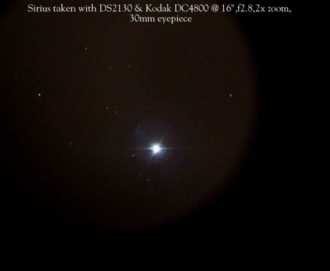
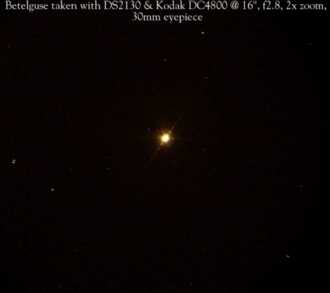
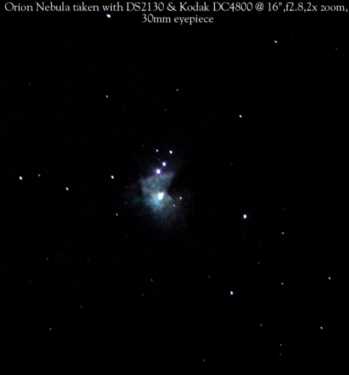
Subject: Photo for ETX Moon Page Sent: Monday, January 28, 2002 20:20:54 From: minuet@worldnet.att.net (Denise O'Neill) First, let me thank you for creating such a wonderful and truly "Mighty" site. It has proved invaluable to me in making my first venture into getting my first scope and continues to educate and inform me. Attached is a memoir from my first night out with my new ETX90ra. Just for fun, I thought I'd try holding my little Kodak DC215 up to the eyepiece . . . doubting it would produce anything. Well . . . Voila! To my surprise it did. Of course, the images were much clearer upon direct viewing. The second image was taken when clouds were going past . . . and I, also, corrected for proper orientation. I used a touch of unsharp in Photoshop on the second, as well. It certainly does not compete with some of the fine images you display on your site . . .but, it sure gave me a thrill! Thanks again! Sincerely, Denise O'Neill
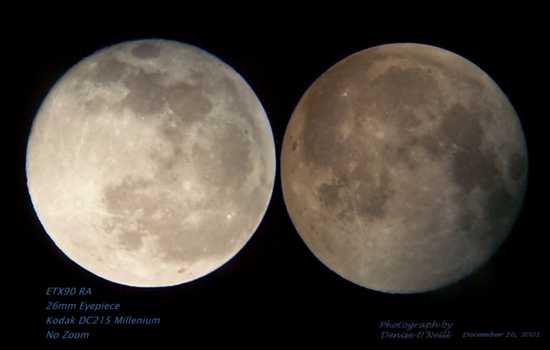
Subject: Kodak DX3500 Sent: Monday, January 28, 2002 21:27:40 From: ken.hurd@verizon.net (Ken Hurd) Do you know of anyone who has or does use the Kodak DX3500, if so what would I require to connect it to a etx 70??? Thanks....Mike here: The Scopetronix Universal Digital Camera Adapter will hold most any camera over the eyepiece. Depending upon the camera itself, you might even be able to use the Scopetronix Digi-T. See the Accessory Reviews - Astrophotography page for more info.
Subject: Astrophotography with a Digital Came Sent: Tuesday, February 5, 2002 15:19:46 From: r.rondjeff@verizon.net I thought I would send a few more of my attempts at Astrophotography for anyone who is contemplating, or reluctant, to try as I have. I realize these are far from good but it's fun and exciting, and I think anyone can do it. Thanks for your Web Site, Ron
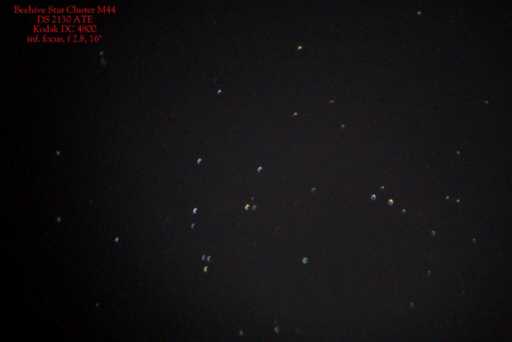
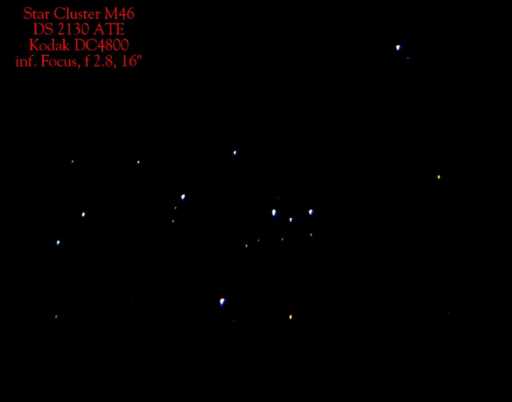
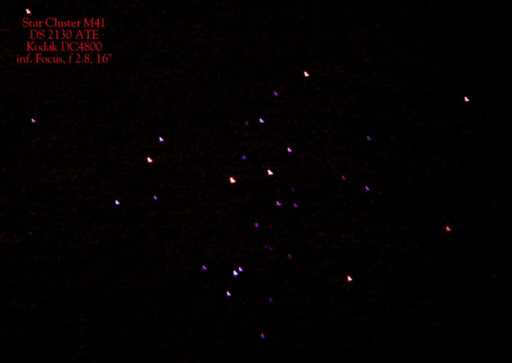
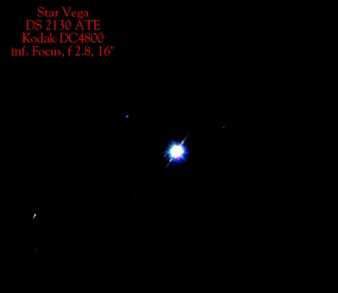
Subject: Astrophotography with digital camera Sent: Thursday, February 28, 2002 6:43:04 From: r.rondjeff@verizon.net (Ron) Here is a picture of the moon taken Feb 1st 2002 with a Kodak DC4800, and slightly edited in Adobe Photo Deluxe. Meade Telestar (Walmart telescope) DS 2130 ATE. Thanks for your tremendous job on your Telescope Web Site, Ron
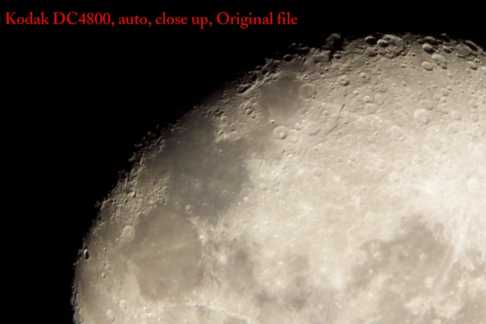
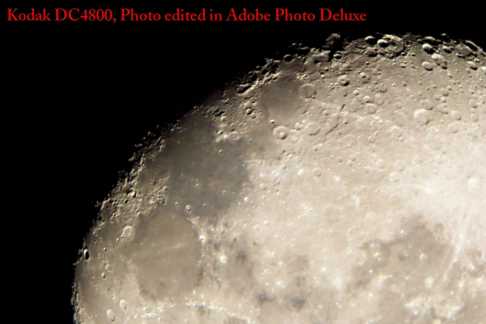
Subject: Photo - Moon and Saturn Sent: Thursday, May 2, 2002 7:25:55 From: simon.perry@misys.com (Simon Perry) Hi and thanks for a great site. I thought I would send this photo I managed to take showing the Moon and Saturn. Picture was taken at 9:00 pm, Tuesday 16 April 2002 in Wolverhampton, UK using a Kodak DC280 attached with a Digi-T kit to my Meade ETX 70-AT. I used a 3x Barlow with a 25mm eye-piece. Photo taken in my garden which has limited visibility and suffers from much light pollution. Image processed using Photoshop - flipped horizontal and Unsharpen Mask applied. The LCD on the DC280 is small and relatively low resolution which makes focussing difficult, and the size limitations of the ETX 70-AT make fine detail capture difficult, but I was pleased with the conjunction of the Moon and Saturn. I'm already thinking about my next 'scope and camera! Regards Simon A. Perry
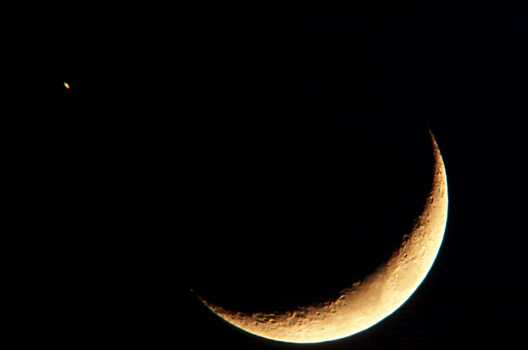
Subject: Jupiter and her moons Sent: Thursday, May 2, 2002 7:40:57 From: Jarrej@aol.com First I would like to say I enjoy your site immensely it has been a very helpful resource. Thank you for your time and effort. I was curious if you or any of your readers could offer any suggestions. I recently took my first nighttime picture through my ETX 125. I used my Kodak DX3900 and Scopetronix MaxVeiw 40 mm. (I really enjoy this eyepiece. I can get the camera lens very close to the lens of the eyepiece. And it works well when used just for viewing too.) I use the auto timer and the default settings for every thing else. I have been practicing for a couple of days on our neighbor's cows and have gotten some really good pics. I thought I would give Jupiter, one of my favorite objects, a try. However I seem to have a problem. It is too bright! It almost looks like another star with four planets rotating around it. Also the moons seem to be too large. I have noticed several other pictures on this site and no one else's moons seem to be this large. Would you suggest using a filter to capture better pictures of Jupiter and if so which one/s. One more thing, do you know of a way to tell which moon is which? Thanks again for the site and your time. Sincerely, John Jarrett
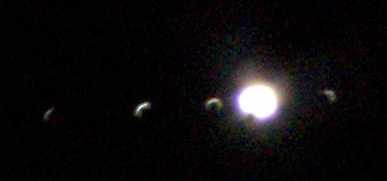
Mike here: Two comments on the Jupiter image: #1 the image does not appear to be in focus (you can see what happens to be the flip mirror in the out-of-focus images) and #2, the camera's light meter for autoexposure will read all that dark sky and try to compensate by increasing the exposure time, resulting in overexposing the illuminated objects. To correct #1 focus the eyepiece to your eye first, focus the camera lens to infinity, then take the picture. To correct #2 adjust the camera's exposure towards underexposure or try a manual mode where you set the aperture and shutter speed (assuming that you can do either with this camera). Trial and error will hopefully get the results you desire.
Subject: ETX-photography-moon Sent: Friday, October 18, 2002 3:29:51 From: Dieter.Wolf@DNSint.com CONTENT: - hint for moon astrophotography with simple, automatic exposure time digital camera (Kodak DC-215) - ETX-70AT moon photo attached Being a reader of your great website for a few months, I'd like to post a simple trick today. Got my father to use his ETX-70AT not only for looking into the mountains (abt. 100 km away) but into the sky too. When trying to do an afocal photo of the moon with his Kodak DC-215 digital camera (1 meg pixels), we experienced the following problem: - the automatic exposure setting (no manual exposure possible) - which is NOT measured through the photo lenses - gives a much too long exposure time - simply switch on the flash (don't laugh!) and take care that the light does not hit the lenses => the exposure time will be fine for moon photography Bye, Dieter from Munich, Germany (Dieter.Wolf@DNSint.com)

Subject: Focus? Sent: Thursday, November 21, 2002 9:55:47 From: snaturequest@earthlink.net (john scanlon) I have a kodak DC 4800 camera, most astrophotography instructions say set camera to infinity focus--i cant find any focus on the camera ??where else can i look? John ScanlonMike here: I don't have this camera but I'll take a shot at an answer. If the camera has a manual mode select that; you should be able to set the focus there, assuming the camera does not have a fixed focus. I'll post your inquiry on tonight's site update; perhaps someone with this camera will respond.
Subject: moon picture Sent: Sunday, January 12, 2003 19:29:45 From: dluke001@tampabay.rr.com (David Luke) I first want to say thanks for hosting such a cool site. I've been visiting your site for about a year now (since I got my ETX-70AT), and your advice has helped me out a number of times. My wife bought me a digital camera this past Christmas, and I was able to find a Scopetronix Digi-T adapter for it. This photo is one of the results. Here are the details: it was taken with a Kodak LS443 through an ETX-70AT using a 25mm eyepiece with a 2x Barlow. The camera was attached to the scope using a Scopetronix Digi-T adapter. I set the exposure compensation to -1.0, turned off the flash and held my breath for 11 seconds (I'm only partly kidding about that last bit). The photo was taken at 6:10pm EST in chilly Tampa, Florida. I used Adobe Photoshop to sharpen the image by two steps and flip it horizontally, so it looks like it does in the sky. This was my first attempt at taking a lunar photo, and I think it turned out pretty well. Let me know if there's anything I could do to make my future endeavors turn out better. Thanks again! Dave Luke

Subject: Moon / ETX125 / Kodak LS443 digital camera Sent: Thursday, October 16, 2003 09:51:23 From: Helenbashford@aol.com Here is one of my very first photos of the Moon. It was taken from Lewes, England at 06:00 UT on 16th October 2003. It is a single shot taken through an ETX-125EC f/15, using a 26mm eyepiece (without a filter), a Kodak LS443 digital camera (at full zoom, exposure set at -2.00) and a Scopetronix Digi T camera adapter. I should like to thank you for your web site and to Dave Luke for his help.
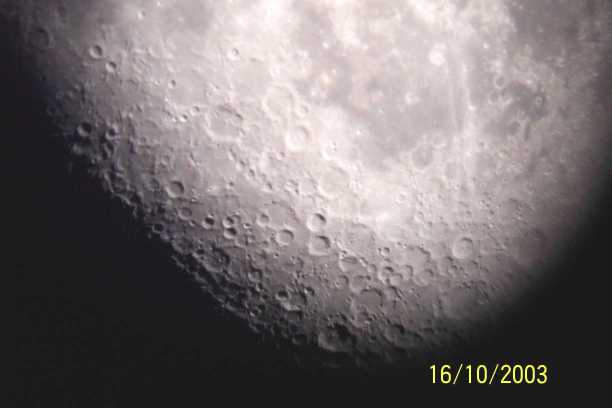
Return to the top of this page.
Go back to the Astrophotography Page.
Go back to my ETX Home Page.